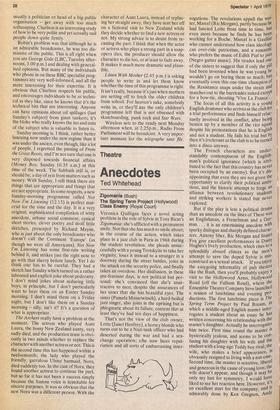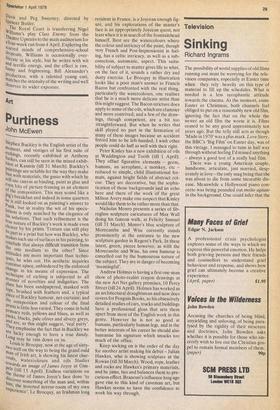Theatre
Anecdotes
Ted Whitehead
Zigoman la (Bush) The Spring Term Project (Hollywood) Class Enemy (Royal Court) Veronica Quilligan faces a novel acting problem in the role of Sylvie in Tony Bicat's Zigomania: she's afflicted with a permanent smile. Not that she has much to smile about; in the course of the action, which takes place in a jazz club in Paris in 1968 during the student revolution, she pleads unsuccessfully with a young Trotskyite to take her virginity, loses it instead to a stranger in a doorway during the street battles, joins in the attack on the security police, and finally takes an overdose. Her disillusion, in these pre-feminist days, is not political but personal: she's convinced that she's unattractive to men, despite the assurances of her sister that she has beautiful eyes. The sister (Pamela Moiseiwitsch), a hard-boiled jazz singer, also joins in the uprising but is phlegmatic about its failure, content that at least they've had ten days of happiness.
That's not the view of the club owner, Lotte (Janet Henfrey), a horsey blonde who turns out to be a Nazi tank officer who had deserted during the war and had a sexchange operation; s/he now faces repatriation and all sorts of embarrassing inter rogations. The revelations appall the wilt
ter, Marcel (Ric Morgan), partly because he had fancied Lotte from time to time, but even more because he finds he has been working for a Boche. Marcel is a Gaullist who cannot understand how class ideologY can over-ride patriotism, and a romantic who prefers the music of Edith Piaf to jazi (Negro gutter music). His tirades lead one of the sisters to suggest that if only the Pill had been invented when he was young he wouldn't go on boring them so much; but eventually even this one-time champion Of, the Resistance snaps under the strain and marches out to the barricades naked except for a bow-tie, shouting Wive La France'.
The focus of all this activity is a young English drummer who arrives at the club for a trial performance and finds himself relue' tantly involved in the conflict, after being beaten up by a member of the riot squad despite his protestations that he is English and not a student. He fails his trial but bY then it's irrelevant as the club is to be turned into a disco anyway.
The French characters are under standably contemptuous of the English" man's political ignorance (which is attributed to the fact that this country has never been occupied by an enemy). But it's disappointing that even they are not given the opportunity to clarify their political ambitions, and the historic attempt to forge a° alliance between revolutionary students and striking workers is stated but never explored. But if the play is less a political dranla than an anecdote on the lines of There was an Englishman, a Frenchman and a Ger' man . .. it is an entertaining anecdote with sparky dialogue and sharply defined charac" ters. Antony Sher, Ric Morgan and Stuart Fox give excellent performances in Dusty Hughes's lively production, which rises to splendidly absurd climax as the men's attempt to save the doped Sylvie is Inis" construed as a sexual attack. If you enjoY the easygoing informality of pub theatre like the Bush, then you'll probably enjoy a visit to the Hollywood Arms, Hollywood ' Road (off the Fulham Road), where the Ensemble Theatre Company have launched a season of lunchtime and evening Pr, ductions. The first lunchtime piece is The Spring Term Project by Paul Bream, which a middle-aged English master interrogates a student about an essay he has written concerning his relationship with the master's daughter. Actually,he interrogates him twice. First time round the master is hysterically jealous, and seems to be confusing his daughter with his wife and the student with a long-ago Teddy boy rival; the wife, who makes a brief appearance, is obviously resigned to living with a nut-case; Second time, the master is sensitive, liberal and generous in the cause of young love; the wife doesn't appear, and though it may be only my lust for symmetry, I would have liked to see her reaction here. However, it's an excellent start for the company, and is admirably done by Ken Gregsori, AndY bavis and Peg Sweeney, directed by Spencer Butler.
The Royal Court is transferring Nigel Williams's play Class Enemy from the Theatre Upstairs to the main auditorium for a fcur-week run from 4 April. Exploring the scarred minds of comprehensive-school 11,.roPouts, Williams is occasionally over'Iterate in his style, but he writes with wit and terrific energy, and the effect is raw, fulalY and frightening. Bill Alexander's Production, with a talented young cast, matches the intensity of the writing and well deserves its wider exposure.
IN"



































 Previous page
Previous page